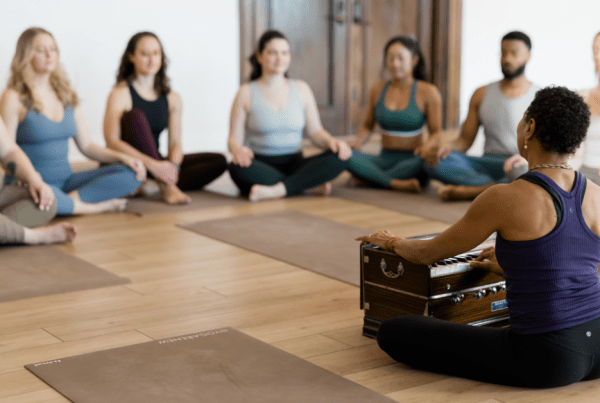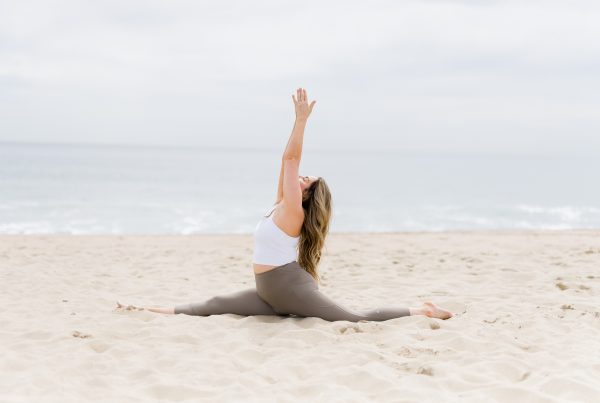
I need to be honest. When I first started going to yoga classes, all I wanted to do was move and breathe and be told what to do. I had way too much going on with work, my relationships, and different dramas in my life that I needed a break from.
Going to yoga was the only thing in my life that gave me a chance to collect myself and go back into the world with a better headspace, but eventually I started to catch myself running through to-do lists while I was in a warrior two or planning dinner while I was in savasana. My mind had gotten over the initial bliss that comes from the newness of yoga and I caught myself on autopilot more times than I’d like to admit.
I didn’t realize how much more there was to yoga until I found myself in a class with a teacher I’d never practiced with before. At the start of class, they started talking about this book called The Bhagavad Gita and how your mind can either be your worst enemy or your best friend.
They spoke about how yoga gives you the tools to be best friends with your mind and how you have the ability to control how you respond to things instead of being reactive. The teacher then told us to notice when our minds wandered off during class and to simply bring our attention back to our breath and what our bodies were doing. Anytime my mind wandered off, I remembered to watch my inhale and my exhale and be present.
After taking my first class that had a bit of yoga philosophy weaved into it, I became hooked on learning more about texts like The Bhagavad Gita and The Yoga Sutras. Lucky for me, most yoga teachers were discussing these texts before and during their classes.
A little over a year later, I completed my 200 hour teacher training and became a teacher too. As a new teacher, I found that studying yoga philosophy actually made my class planning more fun. I loved finding themes for classes and figuring out ways to keep my students engaged throughout class.
I still use my knowledge and studies in yoga philosophy to plan my yoga classes and to weave little reminders into my classes. I truly believe that learning yoga philosophy is good for your yoga class in so many ways. Here are some of my favorites:
1. You will teach your students that yoga isn’t just about the poses
Most people come to a yoga class to move and keep themselves strong and flexible. These are great reasons to practice yoga, but most people eventually get stuck or bored when something is just about being physical. Throughout the years, there have been so many fitness trends and so many new ways to stay in shape, but yoga is one of the few practices that’s stayed pretty popular. This is because it has such a rich history and so much important philosophy that goes alongside the physical practice.
The physical part of yoga is just one small practice amongst many, many others. Once you learn a little about the philosophy, you will see how helpful it is in finding ways to live a life that’s free from suffering. Teaching your students about yoga philosophy will help them realize that yoga is more than asana and there are so many beautifully moving parts that work together to create an experience as well as a way of life.
2. You’ll avoid burnout and boredom
If you’re currently teaching yoga, you may have had an experience or two where you felt like you were teaching the same thing, saying the same thing, and doing the same thing. This can happen when you don’t have inspiration to keep you inspired and fresh. There are only so many yoga asanas and so many ways to combine them safely, but there are endless ways to theme a class and create a mood for your students that’s inspiring and supportive.
Whether you like to give dharma talks or are required to give dharma talks, you’ll find that you’ll run out of ideas pretty soon if you teach somewhat regularly. When you study yoga philosophy, you’ll naturally come across tons and tons of possible themes for your classes and dharma talks. The themes that you find will also be deep, thoughtful, and substantial enough to weave through your classes and keep your students interested because they’re rooted in finding happiness and living a life that’s full of love and goodness.
In case you’re unfamiliar with this idea, a dharma talk is something yoga teachers may include at the beginning of their classes to:
- Set a tone for the practice to come
- Share important yoga philosophy concepts
- Bring everyone’s focus to one specific point
- Create a community
- Give students a moment to settle onto their mats
Check out this 15 Minute Masterclass on giving Dharma Talks ?
3. You’ll naturally create a supportive atmosphere
The fact that our true nature is all-loving is a teaching that’s at the heart of almost all yoga philosophy. When you begin to study this and tap into ways to practice it, you will naturally be more loving and more supportive towards yourself and towards everyone else in your life. What you study becomes what you live and what you live becomes what you teach, so you will be infusing your classes with a supportive mood that your students will want to keep coming back to.
4. The asanas are rooted in yoga philosophy
Did you know that the yoga asanas, or the yoga poses, all have their own story? When you study yoga philosophy, you’ll learn what the true nature of a warrior is, why some of the birds are inspired to fly, and how certain sages rose above suffering by conquering their minds. It’s sometimes said that the asanas embody the qualities that they’re named after, so when you are in a warrior pose, you are naturally calling in the qualities of a warrior. This can be really inspiring and helpful to teach!
There’s so much to uncover…
The more you study yoga philosophy, the more interesting it gets. It’s never been something that’s felt boring to me and it’s always been something that’s inspired me to teach more and more. Anytime I’ve ever felt stuck in a class plan or whenever I lacked inspiration, I always went back to my notes and books from my studies. Since yoga is a practice that goes beyond the physical, it’s incredibly important to understand the other elements that make up the practice.
If you are looking for an accessible and interesting dive into yoga philosophy, check out our course! It’s full of important information, intriguing stories, and endless inspiration!










